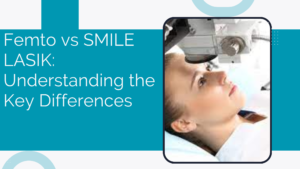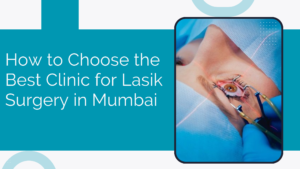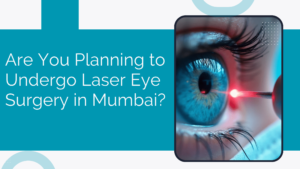Laser vision correction surgeries have become increasingly popular over the past two decades, with LASIK being the frontrunner in helping people achieve freedom from glasses and contact lenses. However, as time passes, many LASIK patients reach the age where cataracts naturally develop. It raises an important question: Is cataract surgery after LASIK a safe option for you? To answer this with clarity, it is crucial to consult a best LASIK surgeon in Mumbai, who can evaluate your case based on your unique eye history and surgical records.
Understanding LASIK and Its Long-Term Effects
LASIK (Laser-Assisted In Situ Keratomileusis) is a type of laser eye surgery in Mumbai that reshapes the cornea to correct vision problems, like myopia, hyperopia, and astigmatism. The procedure is safe, quick, and offers impressive long-term visual outcomes for most patients. However, like all surgeries, LASIK changes the natural structure of the eye, specifically the cornea, which is the clear, dome-shaped surface at the front of the eye.
These structural changes can complicate measurements required during cataract surgery. Accurate calculations of intraocular lens (IOL) power—essential for successful cataract surgery outcomes—rely on the original shape of the cornea.
Cataract Surgery
Cataracts are a common age-related condition that causes the eye’s natural lens to cloud, leading to blurred vision, glare, and difficulty seeing at night. Cataract surgery is a highly effective procedure in which the clouded lens is removed and replaced with a clear artificial intraocular lens (IOL). In the medical field nowadays, cataract surgery is among the most frequently performed and safest surgeries worldwide.
But the presence of prior LASIK changes the complexity of cataract surgery. So it becomes essential to choose a skilled Cataract Surgeon in Mumbai who understands the nuances involved in operating on eyes that have undergone previous refractive surgeries.
Cataract Surgery Challenges After LASIK
When someone who has had LASIK surgery in past undergoes cataract surgery, one of the primary concerns is IOL power calculation. In patients without any history of LASIK, this calculation is straightforward. However, the reshaped cornea in LASIK patients requires different methods for precise calculation. If not completed properly, the patient could end up with residual refractive error after the cataract procedure.
Additionally, surgeons must be aware of any complications that may have occurred during the original LASIK procedure. A comprehensive preoperative evaluation must include topography, axial length measurement, and review of prior surgical data. So, having the previous LASIK surgical records becomes incredibly helpful.
The Role of Technology in Ensuring Accuracy
Fortunately, advances in diagnostic and imaging technologies have made it even easier to measure and correct for changes in corneal curvature due to LASIK. Instruments as corneal topographers, optical biometry devices, and tomography systems allow much greater precision in IOL selection. Surgeons can also use formulas for post-refractive eyes, further increasing the accuracy of outcomes.
Additionally, customizable IOLs and premium lenses such as multifocal and toric lenses have revolutionized cataract treatment, offering greater visual clarity and lower dependence on glasses, even in patients who had LASIK completed earlier in life.
Expertise Matters More Than Ever
The success of cataract surgery after LASIK depends heavily on the expertise of the Surgeon. Having an eye specialist experienced in both LASIK and cataract surgeries ensures that the patient receives a comprehensive approach that takes their complete visual history into account.
Dr. Vinay Agrawal (M.B.B.S., M.S. (Ophthalmology), D.N.B. (Ophthalmology), Cornea Fellow, from L.V. Prasad Eye Institute) is one of the most respected ophthalmologists in Mumbai, with over 30 years of clinical experience. Over the decades, he has honed his skills in the areas of cataract, cornea, and refractive surgeries. These three specialties often overlap, making his expertise invaluable for patients seeking cataract treatment after having undergone LASIK. His greater experience and commitment to personalized care make him a leading choice for those considering cataract surgery in complex cases.
Is It Safe?
So, to answer the question—is cataract surgery after LASIK a safe option for you?—the short answer is yes, with the prompt preparation and a surgeon. While cataract surgery after LASIK is more complex than standard procedures, it is entirely manageable and typically safe when done under expert supervision. The most critical aspect is preoperative planning, accurate diagnostics, and selecting an IOL that suits your altered corneal anatomy.
Patients who had LASIK many years ago are increasingly presenting for cataract treatment, and eye care centers like Clear Vision Eye Centre are fully equipped to handle such cases with precision. Pre-surgical counselling is vital. Patients must understand the risks, benefits, and realistic outcomes before undergoing surgery. With experienced Cataract Surgery in Mumbai, the chances of a successful outcome are significantly enhanced.
Common Patient Concerns
Here are some frequently asked questions by patients considering cataract surgery after LASIK:
Will I still need glasses after cataract surgery? Possibly. Depending on the type of IOL you choose and how your eye heals, you may still require glasses for reading or distance. However, advanced premium lenses can greatly reduce this dependence.
Is the recovery process longer?
No. The recovery timeline is similar to standard cataract surgeries. Most patients see improvement in vision within a few days, with complete healing occurring over 4-6 weeks.
Can I have LASIK again after cataract surgery?
Yes, in some cases. If residual refractive error exists post-cataract surgery and your cornea has adequate thickness, LASIK or another refractive touch-up may be considered.
Postoperative Care and Monitoring
Just like any other cataract procedure, follow-up is essential. Your ophthalmologist will monitor healing, IOL placement, and overall vision clarity. If you had LASIK earlier, they may also check for dry eye or corneal surface irregularities, which are sometimes associated with both LASIK and cataract surgery.
Avoiding strenuous activity, applying prescribed eye drops regularly, and wearing protective eyewear during sleep are common postoperative instructions. Be sure to report any unusual symptoms immediately, such as persistent pain, sudden vision changes, or redness.
Choosing the Right Eye Centre
Having your surgery at a specialized and well-equipped eye care facility is key. At Clear Vision Eye Centre, patients benefit from cutting-edge diagnostic tools, advanced surgical techniques, and a patient-first approach. The centre is run by Dr. Vinay K Agrawal, whose reputation for surgical excellence, compassionate care, and dedication to eye health makes it one of the most trusted names in eye care across the region.
If you had LASIK Eye Surgery in Mumbai in the past and are now noticing signs of cataracts, do not delay your consultation. An early diagnosis can help plan a smoother transition to cataract surgery with fewer complications and better visual outcomes.
Conclusion
Navigating cataract surgery after LASIK requires a careful and well-informed approach. Thanks to advances in ophthalmology and the availability of specialized care, patients can safely undergo cataract procedures even after having had LASIK earlier in life. The key lies in selecting a surgeon with dual expertise in refractive and cataract surgeries.
When considering this path, trust only the most experienced professionals, like the best LASIK surgeon in Mumbai, who can offer not only technical proficiency but also the wisdom that comes with decades of successful surgeries. With the right guidance and care, you can look forward to restoring and even enhancing your vision for the years ahead.
If you are considering your options for cataract treatment in Mumbai, Clear Vision Eye Centre, led by Dr. Vinay K Agrawal, remains one of the best places to seek world-class treatment tailored to your unique eye care needs.




